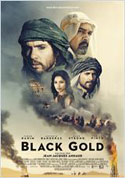

Opening 9 Feb 2012
Directed by:
Jean-Jacques Annaud
Writing credits:
Menno Meyjes, Jean-Jacques Annaud, Alain Godard , Hans Ruesch
Principal actors:
Tahar Rahim, Mark Strong, Antonio Banderas, Freida Pinto, Riz Ahmed
Beautiful sand dunes, shadows in the desert, here an oasis, there a lone horseman. Time stands still. The setting, excellently filmed on location in Qatar and Tunisia by Jean-Marie Dreujou, is the star in this classic story of love, hate, revenge, betrayal, and loyalty. Based on the book The Great Thirst by Hans Ruesch, director Jean-Jacques Annaud has made a film which my colleagues compared to Lawrence of Arabia, but it is so timeless that we could go all the way back to Rudolph Valentino as a sheik.
Nesib (Antonio Banderas) and Amar (Mark Strong) lead two strong tribes of Arabs on the Arabian Peninsula. After long conflicts, they seal the peace by setting up an independent no-man’s land called The Yellow Belt between them. In addition Amar hands over his two small boys to Nesib, to be raised as his adopted sons. These boys, Princes Auda (Tahar Rahim) and Saleeh (Akin Gazi), grow into handsome young men. All is well until white Texans from Houston land in the Yellow Belt and discover oil. Progressive (and perhaps greedy) Nesib welcomes them, gives them the necessary support and dreams of schools, hospitals, and generally improved welfare for his people, all to be financed by oil revenues. Conservative (perhaps old-fashioned) Amar stands for the status quo. He says, “What can be bought has no value. Things from foreign countries, e.g., high-tech machines, are forbidden.” Saleeh and Auda are caught in the middle. Saleeh attempts an unsuccessful escape; he perishes to live on through his pet eagle, a solitary figure in the skies – a symbol of Saleeh’s lost soul.
Halfway through the film, the plot picks up considerably and keeps us riveted to the end. Auda, a bookish student with glasses, leaves his beloved library also to seek his father. He is successful and his metamorphosis is similar to Clark Kent becoming Superman, except that Auda is much better looking than either of those two guys. Draped in traditional white robes, he also sports a green turban (a bow to the protesters in Iran, perhaps?). This mark of individuality is important because he must stand out as the leader of a huge army of Arabs on camelback (10,000 camels and 2,000 horses appear in the film – without any help from computer digitalization).
Naturally, an old-fashioned story needs a romance. Auda and Leyla are childhood lovers in spite of outside obstacles such as Leyla’s father Nesib, who encourages the marriage for political reasons, and Aicha, a tantalizing woman warrior in the field, who could entice any husband to forget his wife. The end is happy, and we cheer as Nesib gets a suitable punishment for his pigheadedness. The moral of the story: be aware whom you adopt; he might supplant you.
Antonio Banderas is fine in his role and a good draw for Western viewers, who might not be familiar with the rest of the cast. But the real star (besides the scenery) is Tahar Rahim, who absolutely dominates the film once he finally gets to take over. Two excellent supporting actors are Liya Kebede, playing Aicha, whom you might know in her role of Warris Dirie in her biography Desert Flower, and Riz Ahmed who plays Ali, a surprise half-brother. He comes across as a kind of Arabian Jack Sparrow. Hopefully both will resurface in new projects.
The story has some truth in it, as, of course, black gold or oil was discovered and it did change the lives of the people in that area. Interestingly, filming occurred in Tunisia during the beginning of the Arabian Revolution in early 2011. Cast and crew worked without fear and finished on time. Director Annaud is still in awe of the fact that he was filming history parallel to experiencing history in the making. (Becky Tan)